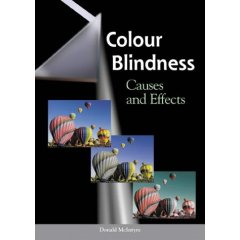
The book Colour Blindness: Causes and Effects is one of my favorite sources for all kind of information related to color vision deficiency. About one week ago I was contacted by the author of the book Donald McIntyre.
I invited him to join us for an interview and I am very pleased that he answered me back so quickly. Please read on and learn about Donald’s color vision deficiency—and more.
Colblindor: Are you suffering from any color vision deficiency yourself?
Donald McIntyre: Yes, I am a protanope. That is to say, I completely lack the set of cones in the retina that are sensitive to long wave (red) light. Reds appear very dark to me and I have great difficulty distinguishing among the range of reds, greens and browns (plus several other confusions).
Colblindor: What inspired you to write a book about color blindness?
Donald McIntyre: I have been aware of my colour vision deficiency since childhood. When I tried to find out more, all I could find were simple one page magazine articles, or highly academic research publications. There was a need for a book that explained colour vision deficiency to the ordinary reader, but in sufficient depth to answer the many questions that arise. Since the book didn’t exist, I decided to write it myself.
Colblindor: If you would write it again, which aspects would you highlight more deeply?
Donald McIntyre: It would have been nice to have time to find more anecdotes about the experiences of colour-blind people in different walks of life. Has any footballer ever passed the ball to the wrong side? I couldn’t find one to speak to.
Colblindor: Do you think there will be a treatment of color blindness in the near future?
Donald McIntyre: Unfortunately not. The computer-based simulations can give a very good idea to the colour normal of what we colour defectives see. But not the other way round!
Colblindor: What do you think about the fact that many colorblind people can’t become pilots, police officers or firefighters?
Donald McIntyre: The problems with colour vision deficiency become serious when a person has to make a critical decision on their own, especially where safety is involved. For instance, there are successful colour-blind electronic engineers who carry out development work in the lab. However, no colour-blind engineer should install or repair wiring in the field.
An important and often overlooked fact is that there are degrees of severity in colour vision deficiency. Protanopia (my sort) is the worst. At the other end of the range of severity, mild deuteranolamy involves a slight shift in the sensitivity of the middle wave cones and may not be a problem in many jobs. The commonly used Ishihara test is very sensitive and will pick up the mildest defect. If a person feels they have been unjustly barred from a profession, they can ask for a more detailed vision assessment and argue their case.
Colblindor: What would you tell a person who just found out that she is colorblind?
Donald McIntyre: First of all, it’s not that serious. Many people do not realise that they have one of the milder forms of colour vision deficiency until adulthood, perhaps when they are tested when applying or a job. It is worth finding out about colour-blindness at a young age, to avoid training for a profession that may produce problems later on. I would not go along with those who say the colour deficient view of the world is “equally valid”. We do lose out on some of the pleasure that colour can give, but there are plenty of other delights in the world.
Dear Donald, thank you very much for your time, for joining the interview and of course for your book.

Hi,my name is Steve and found the interview very good and would expect the book to be very good reading,I like the way he did explain that there are different forms of color deficiency .
I have found that if a person does not pass the Ishihara test you are color blind and you cannot do a certain profession,I cannot pass the Ishihara test but have passed the farnsworth test,I now hold an Australian commercial pilots licence with Nil restrictions and also am a Qualified Locomotive driver,I do not have any problems with my sight doing both jobs,I think we CVD people should be given more “on the job”testing instead of the attide if you dont pass the ishihara sorry bad luck. If you keep trying you will succeed.
Pingback: Anomaloscopul a împlinit 100 de ani în 2007 « Sunt discromat ?i vreau ?ofer